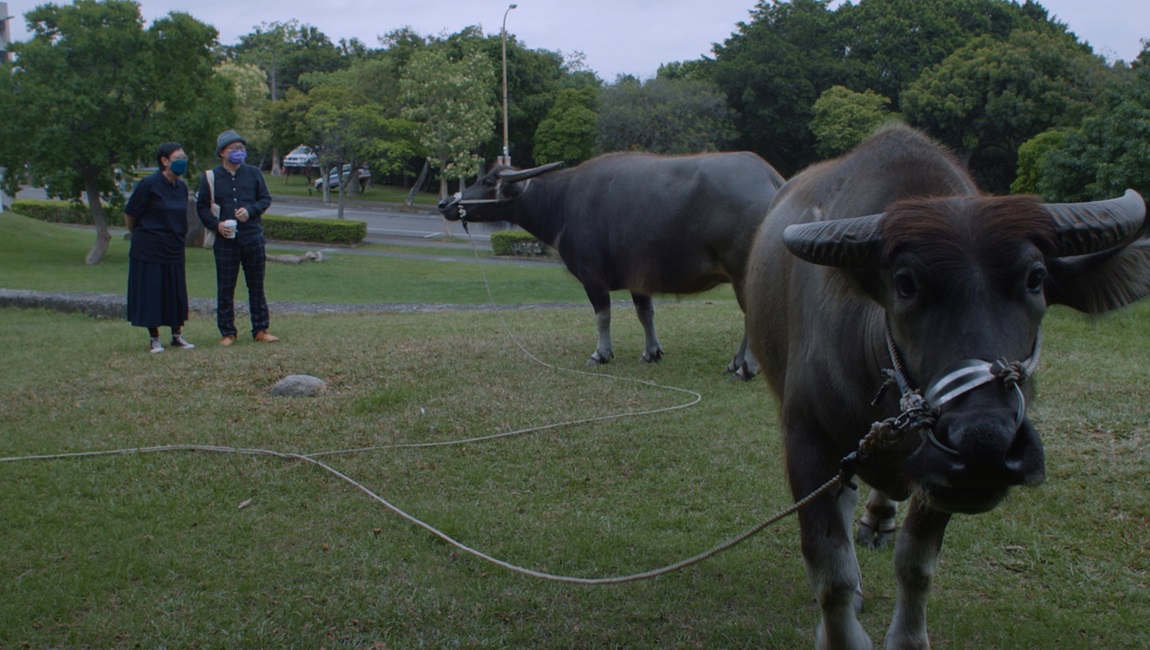The subject of the poets and poetry of Hong Kong is a natural for Ann Hui, always the most literarily inclined of the great directors of her generation, the Hong Kong New Wave. Before studying film in London, she earned a master’s degree in English and Comparative Literature at Hong Kong University, focusing on the work of French writer and filmmaker Alain Robbe-Grillet. In a career now spanning 45 years, she’s adapted a number of literary works, including three novels and stories by Eileen Chang (Love in a Fallen City, Eighteen Springs, and Love After Love) and a two-part adaptation of Louis Cha’s wuxia epic The Romance of Book and Sword, the second part of which, called Princess Fragrance, gives Elegies one of its funniest moments, when one of Hui’s interviewees is asked by his daughter if Hui has made any “Princess films.” Hui’s good humor and self-deprecation are always charming when she appears on film (as in the recent documentary about her, Keep Rolling (Man Lim-chung, 2020), and she proves a delightful guide to the poets of Elegies.
After initially introducing us to a half dozen different poets, their names and dates of birth (and in a couple of cases, death) cited in on-screen text, along with a sample of their work and images of the places around the former colony they’re writing about (Xi Xi’s poem about living near the old Hong Kong airport, for example), Hui settles in to focus on two poets in particular for most of the movie’s running time. The first, Huang Canran, is an older man (though still 15 years younger than Hui herself) whose work evokes the quotidian realities of Hong Kong life, the feel of the sun, the face of a father at a table with his family in a restaurant. Being a poet, Huang talks about the many other jobs he was required to take to survive, working as a journalist, a columnist, a translator, and so on. Lately, he has found himself priced out of Hong Kong, calling himself an “economic exile” to the Mainland (contrasted to the “political exiles” who had to flee there to Hong Kong). Hui’s interviews are leisurely and friendly, focusing first on Huang’s work, the relation of a poet to words and words to meaning, and so on, but gradually, by following him on his various daily routines, broadening to encompass his family as well: his daughter doesn’t really understand why Hui wants to make a movie about him, she replies that her mother doesn’t particularly like her films either.
Hui takes much the same approach with the second primary subject, Liu Wai-tong. Again, we start with him at work — in his case as a professor preparing to lecture remotely during the height of the Covid shutdowns — and gradually broaden our view of him to include his young son (who covertly sends a remote-controlled train into the interview; “stop creating surreal scenes please,” Liu admonishes him), his friends back in Beijing’s old arts scene, and his work as a photographer. In addition to Liu’s own poetry, we get to see sections of his lecture as well, primarily focusing on the poets Paul Celan and Wisława Szymborska (who also was cited by one of the other poets earlier in the film).
By choosing these moments to highlight, Hui is consciously linking her Hong Kong poets to a wider world, and specifically European tradition (and of poets who lived under Communist regimes). The real subject of Elegies, the one on everyone’s mind that no one can come right out and say — they are poets, after all — is the political situation in Hong Kong in the wake of the 2019-2020 protests. Elegies is a lament for a lost Hong Kong. Huang can’t afford to live there anymore, and Liu is in obvious, though unspoken, exile in Taipei. Hong Kong’s special status as a nexus between Europe and China is fading just as rapidly as its old shops and housing estates are being transformed by the forces of capitalist overdevelopment and political integration into the Mainland. In this way, Elegies is less a counterpart to Jia Zhangke’s recent Swimming Out Till the Sea Turns Blue, a chronicle of Mainland Chinese writers, than it is Septet: the Story of Hong Kong, the omnibus project Hui contributed to along with six other leading Hong Kong directors. There’s a very real fear that their Hong Kong, the Hong Kong of the New Wave generation, will soon be gone forever. At one point, Hui asks Huang if, like she and her fellow directors, he feels that if their work isn’t about Hong Kong, then it isn’t really important, because it’s not about home. He agrees completely. The fear is that soon home will be gone, but what comforts Hui, and us, is that the work at least will remain.
Published as part of IFFR 2024 — Dispatch 2.







